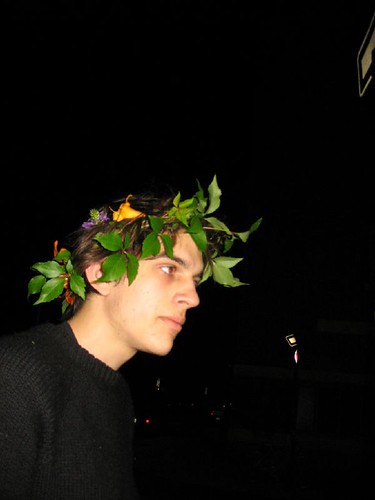I Was An NPC for Capitalism
While it's gratifying to see an Associated Press story about politics use the word livid, and the ominous phrase "talking tougher by the hour," I actually have a lot of sympathy with the AIG executives. Remember when you used to play roleplaying games on the computer, and a bug in the code allowed you to sell the same item to a shopkeeper over and over again, pocketing 100 gold each time and effectively giving you an infinite money supply for the rest of the game?
I don't know about you, but I piled up the gold as fast as I could, even switching to my left hand when my right hand got sore clicking through the dialog boxes. I didn't care if I robbed the whole fantasy world blind; I was just happy to beat the system. I know exactly how these investment bankers must feel.
Adamantine Chains And Penal Fire
 Michael Pollan, the author of In Defense of Food and other textbooks of dietary virtue, is the oracle a confused nation looks to when it wants to know what to have for dinner. His Olympian pronouncements, instructing us to "Eat food," but "Not too much," are much dissected. I can't say whether Pollan intends those gnomic rules of thumb to be taken seriously, or if they are merely written to please the masses. If I had to guess, I'd say that Pollan's actual rules include appearing thin by wearing a shirt many sizes too large.
Michael Pollan, the author of In Defense of Food and other textbooks of dietary virtue, is the oracle a confused nation looks to when it wants to know what to have for dinner. His Olympian pronouncements, instructing us to "Eat food," but "Not too much," are much dissected. I can't say whether Pollan intends those gnomic rules of thumb to be taken seriously, or if they are merely written to please the masses. If I had to guess, I'd say that Pollan's actual rules include appearing thin by wearing a shirt many sizes too large.
In a moment of democratic zeal, Mr. Pollan seems to have invited the masses to contribute their own aphorisms. What vaguely worded, self-serving rules do you pretend to follow when deciding what to eat? The responses, predictably, fall into two camps. A few individuals who know that tall poppies get their heads cut off, wisely quote the party line. "Eat your colors," they nod. Since Michael Pollan is clearly looking for agreement rather than honestly new ideas (Nobody asks a crowd for new ideas. Come on.), this exercise starts to feel pleasantly catechistic.
On the other hand, much more of the commenting body considers itself holier even than Michael Pollan, proudly describing their unwillingness to eat cooked vegetables or milk, in a challenge to the epicurean Pollan. Perhaps they figure that Pollan is naturally appreciative of fussy people, and hope to impress him that way, or maybe they just get worked up about their opinions and feel the need to off-gas. No matter. By now it should be clear that any pretense to being holier than Michael Pollan is a wicked illusion, for it is he who created food virtue. Lucifer in his pride rebelled against God, and likewise the vegans who scold Pollan would rather reign in Hell.
Wikipedia Sentence For Today
What Comes To Mind?
Here's a Web ad I saw today: Bleach and ammonia?
Bleach and ammonia?
Attention Must Be Paid
In the old, old days of Sigmund Freud, it was clear what children wanted: Sexual gratification. Shortly afterward, it ceased to be nice to talk about children that way, and ever since, child psychology has been at sea. The closest thing we have found to a unifying theory of child behavior since has been the concept of attention. Children, the theory runs, want attention, will do anything for attention, and if they can't get benevolent attention, will settle for being smacked and yelled at. The quality or character of attention they receive is unimportant, compared to the intrinsic good of being noticed. Children being complex automata, they desire lots of different things. You can't explain all of a child's behavior as attention-seeking, the theory tells us, but you can explain an awful lot of it.
This theory may be right, for all I know, not being an expert in children, or even liking them. But can we please consider how utterly cracked it sounds? The child is the father of the man, but who among us can say we crave attention? Most adults hate public speaking, and what is public speaking if not the receipt of a huge amount of aggregate attention? Shy people hate getting attention, and the most gregarious people would prefer to be left alone at least sometimes. And does anyone, other than those hypothesized children, prefer to be yelled at rather than peacefully ignored? Can you even imagine such a person?
We're always advised to rear children like animal trainers train animals, those other sentient yet stupid creatures. Children benefit from rote memorization, like animals. Children respond to praise, like animals. But give a dog negative attention, yell at it and beat it, and it won't be anxious to repeat the experience.
Children, this theory needs us to believe, are different from both animals and adults, and even the worst dross is good enough for them. Even if children don't get what they like, they like what they get, and they always come back for more. If the attention theory of child-rearing is correct, I have no qualms in saying that children are horrible little aliens.



